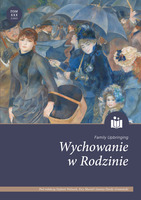Społeczna inkluzja w strefie interpersonalnej dorosłych kobiet z lekką niepełnosprawnością intelektualną na przykładzie relacji z małżonkiem/partnerem, rodzicami oraz rodzeństwem
Social inclusion in the interpersonal zone of adult women with mild intellectual disabilities on the example of relationships with spouse/partner, parents, and siblings
Author(s): Jarosław Bąbka, Regina KorzeniowskaSubject(s): Social Sciences
Published by: Zakład Historii Edukacji w Instytucie Pedagogiki Uniwersytetu Wrocławskiego
Keywords: inkluzja społeczna; niepełnosprawność intelektualna w stopniu lekkim; relacje interpersonalne; wczesna dorosłość; kobieta
Summary/Abstract: Aim. This article describes the manifestations of social inclusion of adult women with mild intellectual disabilities in the interpersonal zone. Methods. The research was carried out using the in-depth interview method. Eleven women between the ages of 23 and 37, who had been issued with a certificate of special education due to mild intellectual disability during their school years, participated in the study. The research results obtained were developed according to the assumptions of the phenomenographic perspective. Results. The women with mild intellectual disabilities surveyed, function in intimate marital or cohabiting relationships. Two types of interpersonal relationships with parents were noted. One is characterised by partnership, respecting the subjectivity of parents and their adult children. The other type refers to difficult relationships with parents as a result of neglect and lack of support earlier in the lives of the women studied. The types of relationships with the siblings of the women studied share a bonding function and differ in the frequency of encounters and their direct or indirect nature. Conclusion. Mild intellectual disability, in the case of the women studied, is not a limiting factor for social inclusion in the interpersonal zone. The interpersonal relationships with members of their immediate family of the women studied are important for their sense of worth, security, family ties, and the respect they are accorded in the local community.
Journal: Wychowanie w Rodzinie
- Issue Year: XXX/2023
- Issue No: 2
- Page Range: 235-260
- Page Count: 26
- Language: Polish

